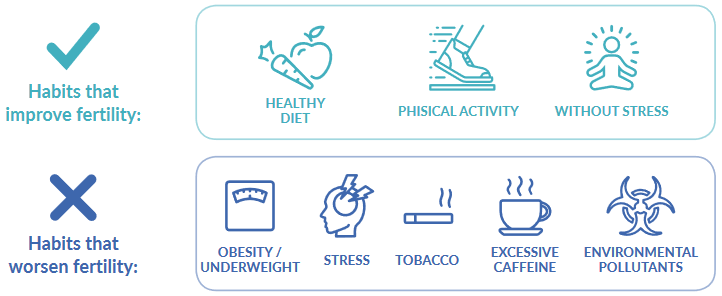During a fertility consultation, patients often ask about the most important factors that can affect their fertility, and whether it can be improved if they modify their lifestyle habits. Although the age of the woman continues to be one of the most important factors, it is not the only one. Diet and lifestyle habits are increasingly regarded as key influencing factors in the fertility levels of both men and women.
A healthy and balanced diet, and a decrease in the consumption of trans fats (baked products and fried foods), with a reduced consumption of animal proteins (especially in the form of red meat, sausages, etc) and an increase of vegetable proteins (legumes, nuts, soy, etc), are healthy habits that can help increase the chance of pregnancy. Taking a vitamin supplement that contains folic acid, iodine and DHA is also recommended, because these nutrients are considered to be beneficial to fertility. However, this should always be done under the supervision of a specialist. Additionally, moderate physical activity done regularly is also beneficial, as it maintains body weight, improving reproductive health.
On the contrary, both obesity and being underweight are detrimental to fertility, with lower rates of pregnancy among women who have a body mass index greater than 30 or less than 20. Being overweight causes changes in the endocrine and metabolic systems that decrease fertility and can cause obstetric complications in the event of pregnancy. While being underweight is associated with ovarian dysfunction (irregular periods) and amenorrhea (an abnormal absence of menstruation), as well as obstetric complications.
Stress is another factor that can cause a decrease in fertility. Women who have high levels of anxiety and stress, experience lower pregnancy rates and are more likely to suffer a miscarriage. In men stress results in a decrease in levels of testosterone, libido, sexual performance and it can potentially alter spermatogenesis.
The consumption of tobacco is one bad habit that affects fertility. Due to the large number of toxic components it contains the risk of infertility is doubled, because it directly affects gametogenesis and influences seminal quality, causing damage to sperm DNA. However, most of the negative effects of tobacco on reproduction are reversed after a year without smoking.
Excessive caffeine consumption also seems to cause a reduction in fertility for both men and women, so it is recommended not to exceed two cups of coffee per day. Other compounds such as excessive amounts of alcohol can vary the levels of prolactin in women or affect seminal quality in men, which can result in erectile dysfunction.
Lastly, environmental pollutants (pesticides, dioxins, or carbon-based solvents such as toluene or benzene), are harmful to the body, reducing reproductive capacity, modifying the hormonal balance and affecting male fertility. Working in a hot working environment (furnaces, steelworks, etc.) can have a negative affect. This is because as the temperature of the testicles increases, the living conditions of the sperm are altered. This is why, if you are trying to get pregnant, it is important that you and your partner remember that changing some bad life habits for healthier ones can be the first step on the road to achieving success.





